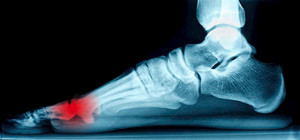Call Us Today! (203) 975-9600
SAME DAY APPOINTMENTS AVAILABLE
Where Are the Sesamoid Bones Located?
Monday, 13 April 2020 00:00 The pain and discomfort that is often experienced with the medical condition sesamoiditis is generally felt under the big toe. Two sesamoid bones are found inside the tendons of the big toe, and can become injured if shoes that are worn do not fit correctly. These types of shoes can include high heels, which typically have inadequate room for the toes to move freely in. A common symptom that many patients experience with this condition can consist of a dull pain that can become stronger as walking and running activities are pursued. It is beneficial to perform exercises that can strengthen the feet, as this may help the foot to generally feel better. If you have pain on the bottom of your foot near the big toe, it is advised that you seek the counsel of a podiatrist who can properly treat this condition.
The pain and discomfort that is often experienced with the medical condition sesamoiditis is generally felt under the big toe. Two sesamoid bones are found inside the tendons of the big toe, and can become injured if shoes that are worn do not fit correctly. These types of shoes can include high heels, which typically have inadequate room for the toes to move freely in. A common symptom that many patients experience with this condition can consist of a dull pain that can become stronger as walking and running activities are pursued. It is beneficial to perform exercises that can strengthen the feet, as this may help the foot to generally feel better. If you have pain on the bottom of your foot near the big toe, it is advised that you seek the counsel of a podiatrist who can properly treat this condition.
Sesamoiditis is an unpleasant foot condition characterized by pain in the balls of the feet. If you think you’re struggling with sesamoiditis, contact one of our podiatrists of Preferred Footcare, LLC. Our doctors will treat your condition thoroughly and effectively.
Sesamoiditis
Sesamoiditis is a condition of the foot that affects the ball of the foot. It is more common in younger people than it is in older people. It can also occur with people who have begun a new exercise program, since their bodies are adjusting to the new physical regimen. Pain may also be caused by the inflammation of tendons surrounding the bones. It is important to seek treatment in its early stages because if you ignore the pain, this condition can lead to more serious problems such as severe irritation and bone fractures.
Causes of Sesamoiditis
- Sudden increase in activity
- Increase in physically strenuous movement without a proper warm up or build up
- Foot structure: those who have smaller, bonier feet or those with a high arch may be more susceptible
Treatment for sesamoiditis is non-invasive and simple. Doctors may recommend a strict rest period where the patient forgoes most physical activity. This will help give the patient time to heal their feet through limited activity. For serious cases, it is best to speak with your doctor to determine a treatment option that will help your specific needs.
If you have any questions please feel free to contact our office located in Stamford, CT . We offer the newest diagnostic and treatment technologies for all your foot and ankle needs.
Call Us Today! (203) 975-9600
SAME DAY APPOINTMENTS AVAILABLE








